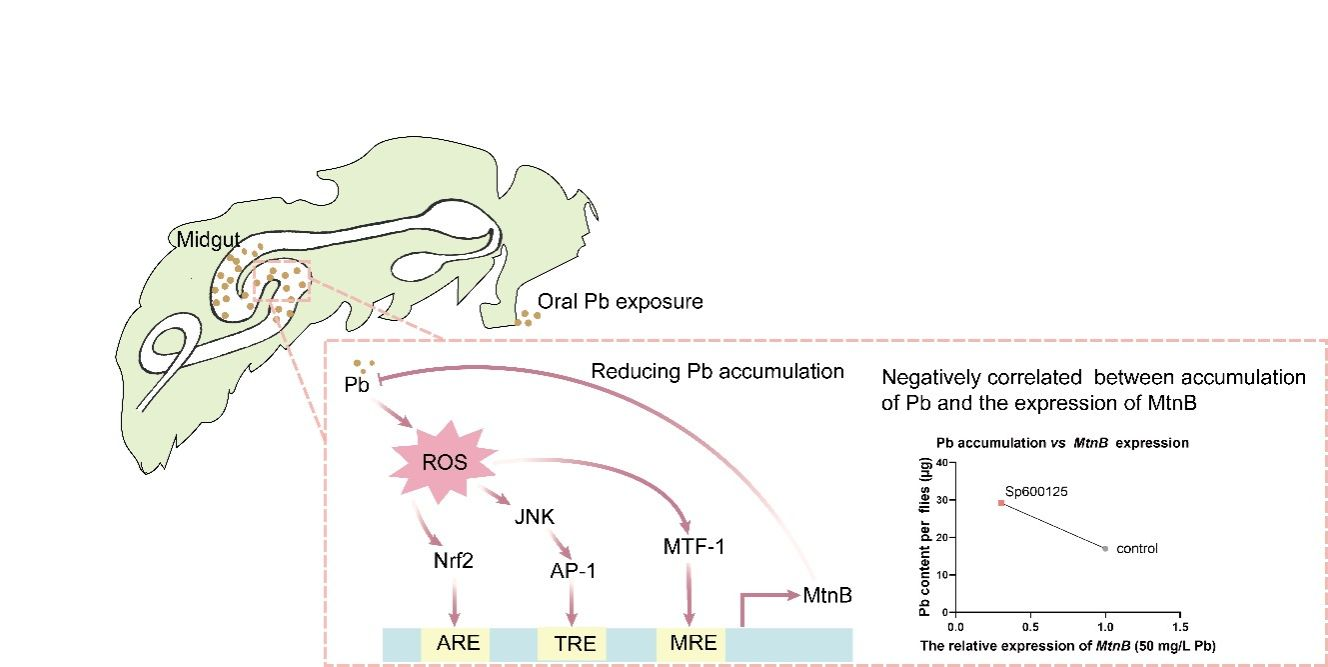Recently, Prof. Yiwen Wang's team at the School of Pharmaceutical Science and Technology, Tianjin University, achieved a breakthrough in the field of heavy metal pollution and biological response mechanisms. Their findings, titled "Lead (Pb) load interacts with oxidative stress in Drosophila melanogaster through MTF-1/Nrf2/JNK mediated metallothionein expression," were published in the internationally renowned journal Ecotoxicology and Environmental Safety. This study is the first to elucidate the regulatory relationship between lead metabolism and oxidative stress in fruit flies, offering new insights into insect responses to heavy metal toxicity and providing theoretical foundations for bioremediation of heavy metal pollution.
Lead (Pb), a widely distributed heavy metal pollutant, poses severe threats to ecosystems and human health. Its toxicity primarily arises from inducing oxidative stress responses that disrupt intracellular redox homeostasis, leading to cellular damage or death. While numerous studies have focused on Pb's impact on redox balance in organisms, the regulatory role of oxidative stress in lead metabolism—particularly its specific mechanisms in insects—remains unexplored.

Prof. Wang's team systematically investigated the effects of lead exposure on oxidative stress responses and lead metabolism in Drosophila melanogaster. The results showed that lead exposure significantly increased reactive oxygen species (ROS) levels in the midgut of fruit flies and triggered oxidative stress. Notably, the team unexpectedly discovered that exogenous oxidant treatment reduced lead accumulation in fruit flies, whereas antioxidant treatment increased lead levels. This phenomenon highlights the pivotal role of oxidative stress in lead metabolism.
Further research revealed that oxidative stress regulates lead accumulation in fruit flies by inducing the overexpression of metallothioneins (MTs), particularly MtnB. Metallothioneins, cysteine-rich proteins, mitigate heavy metal toxicity by binding to metal ions and promoting their excretion. The team further deciphered the molecular mechanism by which oxidative stress regulates metallothionein expression through the MTF-1/Nrf2/JNK signaling network and demonstrated its critical role in lead metabolism. This discovery not only deepens our understanding of the interplay between oxidative stress and lead metabolism but also provides new theoretical support for studying molecular mechanisms of insect adaptation to heavy metal toxicity.
The first author of the paper is Prof. Yiwen Wang from the School of Pharmaceutical Science and Technology, Tianjin University. Co-first authors include Dr. Ying Li and graduate student Xiya Zang from the same institution. Collaborators include Prof. Xiuyun Liu, Prof. Zhiguang Yuchi, Dr. Shushen Sun (Jinnan Hospital, Tianjin), and Dr. Shaoshan Du (Jinnan Hospital, Tianjin). The Instrumental Analysis Center of the School of Pharmaceutical Science and Technology provided substantial technical support. This research was funded by the Tianjin Health Commission Science Project (TJWJ2024MS060), the National Natural Science Foundation of China (2021YFF1200602), and the National Natural Science Foundation of China (Overseas) (0401260011).

